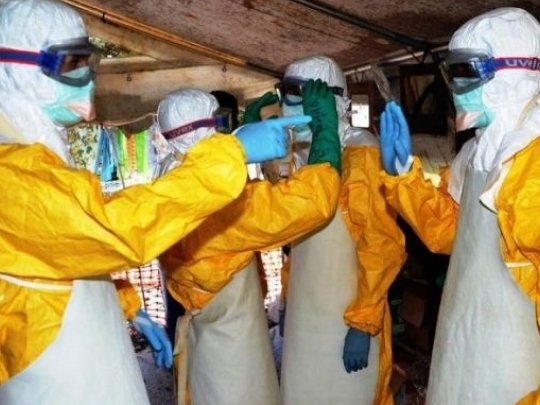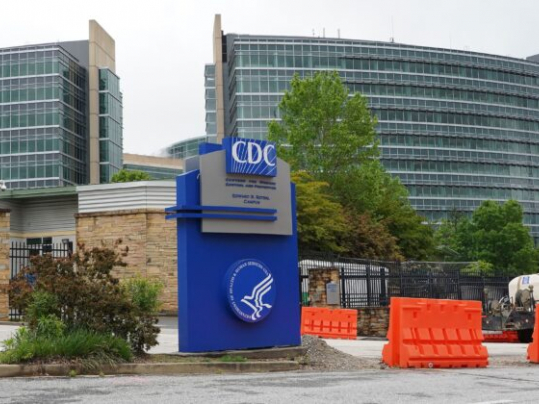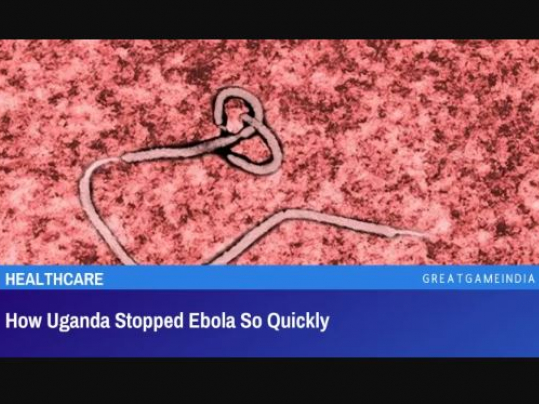Ebola: the new fake outbreak. The virus is the cover story

We’re being warned that a new Ebola outbreak is spreading.
Yahoo News (February 26, 2021): “On Feb. 17, the World Health Organization reported a cluster of Ebola cases in Guinea…The Biden administration is moving forward with plans to screen airline passengers from two African countries arriving in the U.S. for Ebola…”
Before yet another lunatic pandemic story takes off, people need to understand the multiple hoaxes behind Ebola.
I covered the story in 2017 and 2014. Here are the essential quotes from my pieces. Buckle up:
There is one predictable outcome: at Congo clinics and hospitals, frightened people who arrive with what are labeled “early signs” of Ebola will be diagnosed as probable cases. What are those symptoms? Fever, chill, sore throat, cough, headache, joint pain. Sound familiar? Normally, this would just be called the flu.
Here’s another point you won’t see discussed on the mainstream news: the reliability of tests used to diagnose Ebola.
Two of those major tests—antibody and PCR—are notoriously unreliable.
Antibody tests will register positive for disease because they ping on factors that have nothing to do with the disease being looked for. And even when the test is accurate, a positive reading merely shows that the patient came in contact with the germ in question. It says nothing about whether he’s ill or is going to become ill.
In fact, before 1985, when the science was turned on its head, antibody-positive status was taken to mean the patient’s immune system had successfully warded off the germ.
The PCR test is a sophisticated way of amplifying tiny, tiny bits of what are assumed to be viral material, so they can be observed. The problem here is this: if only tiny bits of material could be found in the patient’s body in the first place, there is no reason to suppose they’re enough to cause disease. Very, very large amounts of virus are necessary to begin to suspect the patient is ill or is going to become ill.
Bottom line: huge numbers of people on whom these tests are done are going to be falsely diagnosed with Ebola.
You “show” people a germ and you tell them what it is and what it does, and people salute. They give in. They believe. They actually know nothing. But they believe.
The massive campaign to make people believe the Ebola virus can attack at any moment, after the slightest contact, is quite a success.
People are falling all over themselves to raise the level of hysteria.
And that is preventing a hard look at Liberia, Sierra Leone, and the Republic Guinea, three African nations where poverty and illness are staples of everyday life for the overwhelming number of people.
The command structure in those areas has a single dictum: don’t solve the human problem.
Don’t clean up the contaminated water supplies, don’t return stolen land to the people so they can grow food and finally achieve nutritional health, don’t solve overcrowding, don’t install basic sanitation, don’t strengthen immune systems, don’t let the people have power—because then they would throw off the local and global corporate juggernauts that are sucking the land of all its resources.
In order not to solve the problems of the people, a cover story is necessary. A cover story that exonerates the power structure.
A cover story like a germ.
It’s all about the germ. The demon. The strange attacker.
Forget everything else. The germ is the single enemy.
Forget the fact, for example, that a recent study of 15 pharmacies and 5 hospital drug dispensaries in Sierra Leone discovered the widespread and unconscionable use of beta-lactam antibiotics.
These drugs are highly toxic. One of their effects? Excessive bleeding.
Which just happens to be the scary “Ebola effect” that’s being trumpeted in the world press.
(J Clin Microbiol, July 2013, 51(7), 2435-2438), and Annals of Internal Medicine Dec. 1986, “Potential for bleeding with the new beta-lactam antibiotics”)
Forget the fact that pesticide companies are notorious for shipping banned toxic pesticides to Africa. One effect of the chemicals? Bleeding.
Forget that. It’s all about the germ and nothing but the germ.
Forget the fact that, for decades, one of the leading causes of death in the Third World has been uncontrolled diarrhea. Electrolytes are drained from the body, and the adult or the baby dies. (Diarrhea is also listed as an “Ebola” symptom.)
Any sane doctor would make it his first order of business to replace electrolytes with simple supplementation—but no, the standard medical line goes this way:
The diarrhea is caused by germs in the intestinal tract, so we must pile on massive amounts of antibiotics to kill the germs.
The drugs kill off all bacteria in the gut, including the necessary and beneficial ones, and the patient can’t absorb what little food he has access to, and he dies.
Along the way, he can also bleed.
But no, all the bleeding comes from Ebola. It’s the germ. Don’t think about anything else.
Forget the fact that adenovirus vaccines, which have been used in Liberia, Guinea, and Liberia (the epicenter of Ebola), have, according to vaccines.gov, the following adverse effects: blood in the urine or stool, and diarrhea.
Reporter Charles Yates uncovered a scandal in Liberia centering around the Firestone Rubber Plantation—chemical dumping, poisoned water.
And skin disease.
“Rash” is listed as one of the Ebola symptoms.
Liberia Coca Cola bottling plant: foul black liquid seeping into the environment—animals dying.
Chronic malnutrition and starvation—conditions that are endemic in Liberia, Sierra Leone, and Guinea—are the number-one cause of T-cell depletion in the world.
T-cells are a vital component of the immune system. When that system is compromised, any germ coming down the pipeline will cause epidemics and death.
Getting the picture?
In email correspondence with me, David Rasnick, PhD, announced this shocking finding:
“I have examined in detail the literature on isolation and Ems [EM: electron microscope pictures] of both Ebola and Marburg viruses. I have not found any convincing evidence that Ebola virus (and for that matter Marburg) has been isolated from humans. There is certainly no confirmatory evidence of human isolation.”
Rasnick obtained his PhD from the Georgia Institute of Technology, and spent 25 years working with proteases (a class of enzymes) and protease inhibitors. He is the author of the book, The Chromosomal Imbalance Theory of Cancer. He was a member of the Presidential AIDS Advisory Panel of South Africa.
The real reasons for the “Ebola outbreak” include, but are not limited to: industrial pollution; organophosphate pesticides (causes bleeding); vast overuse of antibiotics (causes bleeding); severe and debilitating nutritional deficiencies (which can cause bleeding); starvation; drastic electrolyte loss; chronic diarrhea; grinding poverty; war; stolen farm land; vaccination campaigns (in people whose immune systems are compromised, vaccines can easily wipe out their last shreds of health).
Doctors and nurses in West Africa are working in very high temperatures, in clinic rooms likely sprayed with extremely toxic organophosphate pesticides. These workers are sealed into hazmat suits, where temperatures rose even higher, causing the loss of up to five liters of body fluid during a one-hour shift. Then, recovering, they need IV rehydration, and they are doused with toxic disinfectant chemicals. They go back into the suits for another round of duty. One doctor reported that, inside his suit, there was (toxic) chlorine. These factors alone could cause dangerous illness and even death, and, of course, the basic symptoms of “Ebola.”
People diagnosed with Ebola outside West Africa? Again, the diagnostic tests are completely irrelevant and unreliable. Illness, if any, could come from a variety of causes. The “Ebola symptoms” are similar, for example, to the flu.
Repackaging a set of common symptoms under different disease labels is a standard practice of the medical cartel.
Even assuming the Ebola virus exists, the experts were expressing grave doubts all the way back in 1977. Right at the beginning of Ebola hysteria.
The 1977 reference here is: “Ebola Virus Haemorrhagic Fever: Proceedings of an International Colloquium on Ebola Virus Infection and Other Haemorrhagic Fevers held in Antwerp, Belgium, 6-8 December, 1977.”
This report is 280 pages long. It’s well worth reading and studying, to see how the experts hem and haw, hedge their bets, and yet make damaging admissions:
For example, “It is impossible to consider the virological diagnosis of Ebola virus infection loose [apart] from the diagnosis of haemorrhagic fevers in general. The clinical picture of the disease indeed is too nonspecific to allow any hypothesis as to which virus may be responsible for any given case.”
Boom.
Here is a particularly illuminating quote: “…it is becoming clear, to us at least, that the more work you do with the FA-Test [an antibody test for Ebola diagnosis] the more interesting, the more complicated and the more biologically sloppy the results become. I would urge very great caution in making any kind of final interpretation of what you have just heard [from other presenters]…I cannot explain how a Panamanian Indian can have antibodies to Ebola virus. I don’t think these are real antibodies. Of course if these are not, it means that any others in a given serum [blood sample from a patient] may not be as well. It is clear that we must have an alternative and a much more specific method with which we can answer these questions. Several facts suggest endemicity of Ebola in Zaire…I’m beginning to believe that the virus may in fact be endemic in Zaire.”
What do the last two sentences mean? They mean there is a significant chance that Ebola has been present in Zaire for a long, long time, and people have developed natural immunity to it, as they would to, say, measles or mumps.
Hardly the stuff of “outbreaks” and viral “hot zones” and recent “epidemics.”
Irrelevant or non-existent viruses function as cover stories to conceal actual and inconvenient causes of illness, such as industrial pollution, ag pesticides, GMO food, fracking chemicals, radiation, etc.
The medical cartel and its government allies move a step closer to being able to mandate all vaccines for the population, with no exemptions permitted.
The overall toxifying and weakening of populations, through vaccines and drugs, thus moves forward. Weakened=easier to control.
Selective quarantines further establish unconstitutional government control over the people. A phony epidemic can trigger the wide declaration of martial law.
Under the aegis of “tracking carriers of the virus,” the Surveillance State expands.
Combining the epidemic op with open borders, the government and medical authorities can assert there are now vast numbers of unvaccinated people in the US (immigrants)—and they must be protected, through “herd immunity,” by vaccinating everyone in the US with every conceivable vaccine.
Under the cover of “a global pandemic,” toxic modern medicine can expand its reach into every corner of the globe as a necessary platform for treating ‘infected populations’.”
The DOD and DHS expand their operations, because “every pandemic is a threat to national security.”
The Globalist view of one world under one controlling management system is enhanced—“every epidemic threatens all of us, we’re all in this together, we need, among other innovations, one coordinated medical system for the whole planet.”
Travel to and from any point in the world can be cut off arbitrarily—more top-down control.
Through declaring “infected zones,” economic attacks can be leveled by isolating and quarantining those zones. Loss of business, loss of money—the IMF and World Bank step in and make draconian deals for loans, in exchange for surrender to mega-corporate control of those territories.
In the wake of “fear of the epidemic,” all national health insurance programs on the planet, including Obamacare, can assert more power over the people—“we’re here to protect you from illness and death, so accept all diagnoses and treatments; no opting out, no resistance…”
Further attacks can be launched at traditional and natural solutions to illness—“how dare people try to treat Ebola with anything except (unproven and toxic) drugs and vaccines.”
Further propaganda covertly characterizes “deepest darkest Africa” as the place where terrible things come from.
“The killer virus” functions as a cover story, concealing the centuries-long campaign to weaken and decimate the populations of Africa through starvation, wars, contaminated water supplies, overcrowding, theft of fertile farm land and other natural resources, toxic vaccine campaigns.
To those who point out there is a history of hemorrhagic (bleeding) fevers in parts of Africa, there is also a history of horrendous malnutrition, one aspect of which is scurvy, which also causes bleeding from all mucous membranes.
Scurvy is far from the complete explanation for “Ebola,” but it exemplifies how easy it is to overlook and intentionally ignore non-germ factors.
Bottom line: no need for a virus to explain the bleeding.
Then we have pesticides.
The reference here is “Measuring pesticide ecological and health risks in West African agriculture…” Feb. 17, 2014, published in Philosophical Transactions of The Royal Society, by PC Jepson et al.
“The survey was conducted at 19 locations in five countries and obtained information from 1704 individuals who grew 22 different crops. Over the 2 years of surveying, farmers reported use of 31 pesticides…
“…certain compounds represented high risk in multiple environmental and human health compartments, including carbofuran, chlorpyrifos, dimethoate, endosulfan and methamidophos.
“Health effects included cholinesterase inhibition, developmental toxicity, impairment of thyroid function and depressed red blood cell count…”
The study also notes that “[p]esticide imports to West Africa grew at an estimated 19% a year in the 1990s…well ahead of the growth in agricultural production of 2.5%…” In other words, pesticides have flooded West Africa.
Here is another vital observation made in the study: “The distribution and sale of pesticides in West Africa is not effectively regulated. Multiple channels of supply commonly include the repackaging of obsolete or illegal stocks [extremely toxic] and the correspondence between the contents of containers to what is stated on the label is poor…”
Pesticide suppliers conceal banned pesticides—which they are taking a loss on, because they can’t sell them—and put them inside containers labeled with the names of legal pesticide.
Let’s consider the pesticides specifically mentioned in the study.
Carborfuran—According to the New Jersey Dept. of Health and Senior Services’ Hazardous Substance Fact Sheet, exposure to Carbofuran “can cause weakness, sweating, nausea and vomiting, abdominal pain, and blurred vision. Higher levels can cause muscle twitching, loss of coordination, and may cause breathing to stop [imminent death].”
Chloropyrifos, dimethoate, and methamidophos are organophosphates. In my previous article, I cited such compounds as a source of internal bleeding (an “Ebola” symptom). The Pesticide Action Network describes organophosphates as “among the most acutely toxic of all pesticides…they deactivate an enzyme, Cholinesterase, which is essential for healthy nerve function.”
Endosulfan is being phased out globally, because it is extremely toxic and disrupts the endocrine system.
These pesticides can and do produce a number of the symptoms called “Ebola:”
Bleeding, nausea, vomiting, diarrhea, rash, stomach pain, coma.
But all this is swept aside in the hysteria about The Virus.
Here is a quote from a study, “Potential for bleeding with the new beta-lactam antibiotics,” Ann Intern Med December 1986; 105(6):924-31:
“Several new beta-lactam antibiotics impair normal hemostasis [body processes that stop bleeding]… These antibiotics often cause the template bleeding time to be markedly prolonged (greater than 20 minutes)… dangerous bleeding due to impaired platelet aggregation requires treatment with platelet concentrates.”
Here is a summary from MedlinePlus:
“The Clostridium difficile bacteria normally lives in the intestine. However, too much of these bacteria may grow when you take antibiotics. The bacteria give off a strong toxin that causes inflammation and bleeding in the lining of the colon…Any antibiotic can cause this condition. The drugs responsible for the problem most of the time are ampicillin, clindamycin, fluoroquinolones, and cephalosporins…”
So let’s look at the level of antibiotic use in West Africa and the Third World.
Voice of America, February 26, 2014, “…antibiotics have become the automatic choice for treating a child with a fever.”
AAPS (American Association of Pharmaceutical Scientists): “For instance, in most areas of West Africa, antibiotics are commonly sold as over-the-counter medications.”
TWN (Third World Network): “…a survey carried out in 1999 showed that nearly one out of two antidiarrheal products in Third World countries contained an unnecessary antibiotic [and chronic diarrhea in the Third World is a leading cause of death, so you can be sure that these antidiarrheal drugs are consumed in great quantities].
“…75 products (including some antibiotics) which had been pulled out or banned in one or more European countries were identified in the Third World in 1991.”
Of course, banned antibiotics would be exceptionally toxic.
In West Africa, antibiotic use is sky-high…and antibiotics do cause bleeding.
Bleeding where? In the digestive tract.
In light of that, consider the following excerpt from the healthgrades.com article, “What is vomiting blood?”
“Vomiting blood indicates the presence of bleeding in the digestive tract…
“Vomiting blood may be caused by many different conditions, and the severity varies among individuals. The material vomited may be bright red or it may be dark colored like coffee grounds…”
Yes, it turns out that any source of internal bleeding in the digestive tract—such as overuse of antibiotics—can cause a person to vomit blood.
“The uniqueness” of “Ebola-blood-vomiting” is a fairy tale.
What else could cause the “Ebola” bleeding symptom in West Africa?
We have the fact that organophosphate insecticides are being widely used for indoor spraying, in West African homes and, surely, in clinics, to kill mosquitos. One study reports: “With high DDT resistance present throughout much of West Africa, carbamates and organophosphates are increasingly important alternatives to pyrethroids for indoor residual spraying (IRS).”
Among the effects, from severe exposure to organophosphates: diarrhea, tremors, staggering gait, blood disorders, death—all of which have been described in reference to Ebola.
And then there is this: “In nine patients suffering from organophosphate intoxication, platelet function and blood coagulation parameters were investigated…In five of nine patients a marked bleeding tendency was observed. The bleeding tendency in organophosphate intoxication is probably mainly caused by the defective platelet function.” (Klin Wochenschur, Sept. 3, 1984;62 (17):814-20, author: m. Zieman)
Bleeding. Not from a virus.
What about vaccines?
A number of vaccination campaigns have been carried out in West Africa. I have found no in-depth independent investigations of the ingredients in these vaccines. But for example, a simple flu vaccine, Fluvirin, carries the risk of “hemorrhage.”.
Several other routine vaccines can cause vomiting. The HiB, for example.
What about formaldehyde?
We have this chilling report—From the (Liberian) Daily Observer, Oct. 14, “Breaking: Formaldehyde in Water Allegedly Causing Ebola-like symptoms”:
“A man in Schieffelin, a community located in Margibi County on the Robertsfield Highway, has been arrested for attempting to put formaldehyde into a well used by the community.”
“Reports say around 10 a.m., he approached the well with powder in a bottle. Mobbed by the community, he confessed that he had been paid to put formaldehyde into the well, and that he was not the only one. He reportedly told community dwellers, ‘We are many.’ There are agents in Harbel, Dolostown, Cotton Tree and other communities around the country, he said.”
“State radio, ELBC, reports that least 10 people in the Dolostown community have died after drinking water from poisoned wells.”
The ATSDR (US Agency for Toxic Substances and Disease Registry) in its Guidelines for medical management of formaldehyde poisoning, lists these symptoms: “nausea, vomiting, pain, bleeding, CNS depression, coma…”
There are other sources of poisoning in West Africa. Their components and effects need further investigation.
For example: Firestone.
For nearly a century, the company has run a giant rubber plantation in Liberia. According to one estimate, Firestone controls 10% of the arable land in the country.
Aside from the wretched living and working conditions of the locals, who tap the trees for rubber, and bring their young children to work in order to meet Firestone daily quotas, there is the issue of massive pollution.
From irinnews: “LIBERIA: Community demands answers on rubber pollution”:
“MONROVIA, 4 June 2009 (IRIN) – People living next to Firestone Natural Rubber Company’s plantation in Harbel, 45km outside of Liberia’s capital Monrovia, say pollution from the concession is destroying their health, ruining their livelihoods and even killing residents.”
“Firestone’s Liberia rubber concession is the second largest rubber producer in Africa and employs some 14,000 Liberians.”
“Residents of the town of Kpanyarh, just next to Firestone’s rubber plantation in Harbel, say the creek from which they fish and drink their water in the dry season has been contaminated with toxins.”
“’We used to fish and drink the water,’ 67-year-old Kpanyarh resident John Powell told IRIN on a visit to the creek which runs just outside the town. He said the water became toxic in October 2008. ‘We can’t drink it any longer. Some of our people have already died from this. We have drawn Firestone’s attention to our plight but they have ignored it.’”
“In mid-May on an IRIN visit to the area, acidic fumes emanating from the creek caused people’s eyes to water and made it difficult to breathe.”
From BBC News: “The three-month investigation found that a plant south-east of the capital Monrovia was responsible for high [toxic] levels of orthophosphate in creeks.”
From laborrights.org: Because of lack of drinkable water on the plantation, “this situation leaves tappers and other unskilled employees and their families with no option but to drink from shallow wells and creeks.”
And of course, those creeks are heavily polluted.
Who knows how many and what toxic chemicals have been released from the Firestone plantation into the surrounding creeks and rivers?
A further investigation in West Africa could well turn up even more reasons for bleeding—none of which has anything to do with a virus. The region is rife with industrial operations which produce major pollutants—mining, offshore oil exploration and drilling, rubber-tapping, etc.
Then we come to the frightening press stories about the “Ebola-stricken, collapsing” doctors and health workers, who are treating patients in the Ebola clinics in West Africa.
But wait. These health workers have been wearing hazmat suits. Sealed off from the outside world, working shifts inside those boiling suits, where they are losing 5 quarts of body fluid an hour, they come out for rehydration, douse themselves with toxic chemicals to disinfect, and then go back in again.
One doctor told the Daily Mail he could smell intense fumes of chlorine while he was working in his suit. That means the toxic chemical was actually in there with him.
No wonder some health workers are collapsing and dying. No virus necessary.
From the Daily Mail, August 5, 2014, an article headlined, “In boiling hot suits…”:
“Doctor Hannah Spencer revealed how she wills herself to feel safe inside a boiling hot air-sealed Hazmat suit…”
“Boiling: Doctors and nurses lose up to five litres in sweat during an hour-long shift in the suits and have to spend two hours rehydrating after…”
“To minimise the risk of infection they have to wear thick rubber boots that come up to their knees, an impermeable body suit, gloves, a face mask, a hood and goggles to ensure no air at all can touch their skin.”
“Dr. Spencer, 27, and her colleagues lose up to five litres of sweat during a shift treating victims and have to spend two hours rehydrating afterwards.”
“At their camp they go through multiple decontaminations which includes spraying chlorine on their shoes.”
“Dr. Spencer: ‘We would like to keep a [patient] visit between 45 minutes and one hour, but now, we’re stretching it to almost two hours. We put ourselves through a very strong physiological stress when we’re using personal protection gear.’”
“‘We sweat, we’re losing water; we’re getting hotter and it wreaks havoc on the body. Our own endurance starts to wear down.’”
From another Daily Mail article (“What’s shocking is how Ebola patients look before they die…”), Dr. Oliver Johnson describes working in protective gear: “The heat of the suits is quickly overwhelming, as your goggles steam up and you feel the sweat dripping underneath. And the smell of chlorine is intense.”
Getting the picture? Imagine losing five quarts of water from your body in an hour. While you’re trapped inside a bulky hazmat suit. While you’re treating a patient who, for example, might want to escape the clinic because he’s afraid of you and your Western medicine.
Imagine needing two hours after you climb out of your suit to rehydrate. Then you go back for more. Of course you also decontaminate yourself with toxic chemicals, including chlorine.
But of course, this has absolutely nothing to do with why you might fall ill. No. If you fall ill, or collapse, or suddenly die, it’s Ebola. The virus.
Sure it is.
No need to wonder. Don’t ask questions. Believe the World Health Organization and the Centers for Disease Control. They always tell the truth.
As I wrote at the top of this article, I’ve been quoting my own reporting from 2017 and 2014 here. Everything you’ve just read about Ebola comes from my published pieces in those two time periods.
Now we have the harsh lesson of COVID. And we have 2021 announcements about another Ebola outbreak.
Another EXTREME outbreak of lies.
- Source : Jon Rappoport


















